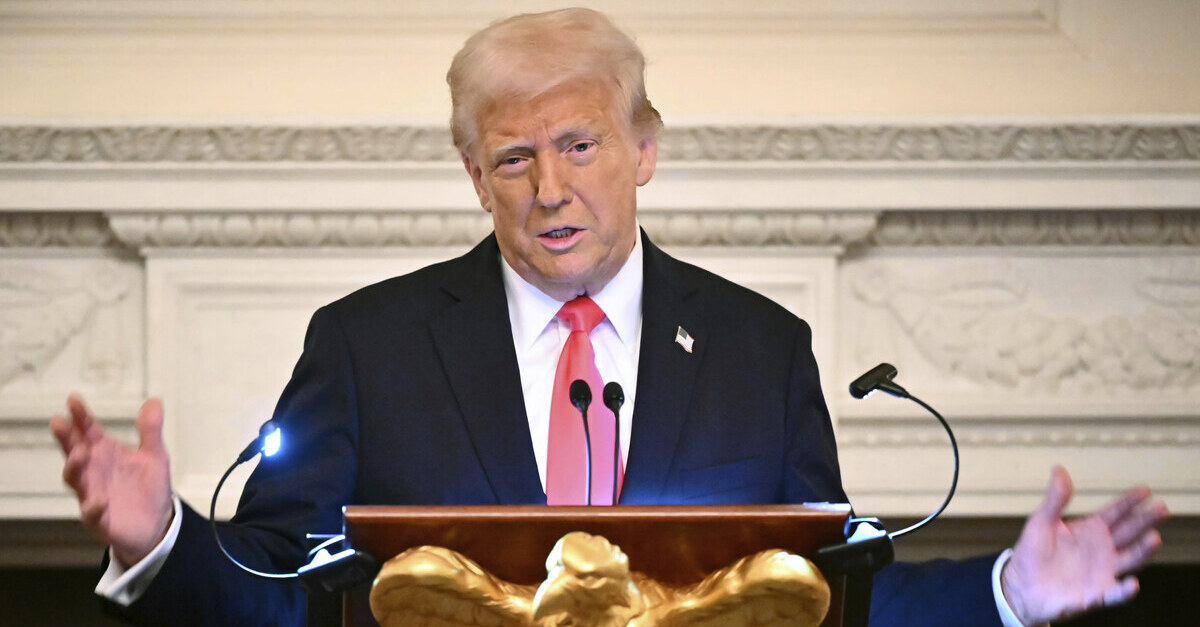
President Donald Trump gestures as he speaks during an Iftar dinner in the State Dining Room at the White House in Washington, Thursday, March 27, 2025 (Pool via AP).
A federal judge in Colorado has become the second judge to hold that President Donald Trump’s March proclamation invoking the Alien Enemies Act (AEA) to fast-track deportations to El Salvador with little or no due process is unlawful.
U.S. District Judge Charlotte Sweeney on Tuesday granted a preliminary injunction barring the administration from removing the plaintiffs — two Venezuelan men currently jailed in Aurora — as well as any “noncitizens” in the district who “were, are, or will be subject to” deportation under the 18th-century wartime power.
Sweeney issued her 25-page ruling two weeks after she granted a temporary restraining order in which she methodically broke down the “fundamental” problems with the administration’s use of the AEA. That TRO ruling was later upheld by a three-judge appellate court panel.
After summarizing the background of the case, Sweeney quickly recounted and dispatched with numerous threshold issues put forth by the Department of Justice, including claims that the petitions lacked standing in the case, the court lacked jurisdiction over the matter, and the assertion that the president’s executive order was not reviewable by the court.
Love true crime? Sign up for our newsletter, The Law&Crime Docket, to get the latest real-life crime stories delivered right to your inbox.
Regarding the latter argument, the administration contended that “federal courts cannot issue ‘injunctions purporting to supervise the President’s performance of his duties,’ including his exercise of power and authority under the Act,’ adding that the AEA granted Trump “unreviewable discretion.”
Sweeney was emphatic in declaring that such an argument “runs afoul of the separation-of-power principles” that administration officials “purport to value.”
“Granting Petitioners injunctive relief does not amount to ‘enjoining the President’s exercise authority under Article II,”” Sweeney wrote (citations omitted). ” Judicial review of the Proclamation and Act is a proper exercise of federal courts’ authority. Federal courts and judicial review are a feature — not a defect — of this Nation’s constitutional structure. And simply because federal courts issue rulings unfavorable to the government is no basis, standing alone, to dispute their constitutional authority or power. Especially in a case such as this that hinges on statutory interpretation of the Act — a power of judicial authority the United States Supreme Court has both endorsed and exercised itself.”
The Joe Biden-appointed judge continued her caustic criticism of the administration’s legal arguments, calling them “threadbare costumes for their core contention.”
The Justice Department had previously written: “As for whether the [Alien Enemies] Act’s preconditions are satisfied, that is the President’s call alone; the federal courts do not have a role to play.” Such an assertion clearly left Sweeney shocked.
“This sentence staggers,” she wrote. “It is wrong as a matter of law and attempts to read an entire provision out of the Constitution. The Court declines Respondents’ invitation to engage in such a revisionist exercise.”
Discussing the merits of the case, Sweeney ultimately held that the administration’s invocation of the AEA was unconstitutional as the president’s proclamation failed to meet the preconditions prescribed in the Act.
Under the AEA, the president is authorized to summarily remove “natives, citizens, denizens, or subjects” of a “hostile nation or government” when there is “declared war” against it or when it has “perpetrated, attempted, or threatened against the territory of the United States” an “invasion or predatory incursion.” In a controversial and novel use of the power, Trump declared that the Venezuelan gang Tren de Aragua (TdA) had engaged in an “invasion” or “predatory incursion” of the U.S. such that any member of the group was summarily removable under the Act.
A Trump-appointed judge in Texas last week was the first to rule on the merits and, as Sweeney points out, he “rejected virtually identical arguments” the administration was advancing in her court.
Sweeney also reiterated that the government would not be “irreparably harmed” by granting the preliminary injunction, because the plaintiffs could still be prosecuted and deported under non-AEA statutes.










